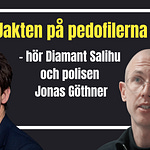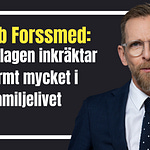Antalet barn och ungdomar som vänder sig till vården för att de upplever att de är födda i fel kön – könsdysfori eller transsexualism – har ökat lavinartat på senare år i Sverige. Lite statistik: 1998 var andelen av befolkningen som diagnosticerats med könsdysfori strax över 0 av 100 000 invånare, för att 2007 ligga på totalt 31 personer. Tio år senare hade antalet ökat med över 2 300 procent, till 727 personer. År 2018 hade totalt 5841 personer – 1 av 1700 – någon könsdysforidiagnos i Sverige.
I ett tidigare avsnitt av podden pratade jag med Aleksa Lundberg om transfrågan. I dag ångrar hon sin transition till kvinna, även om hon stöttar möjligheten att göra det. Men att fler och fler upplever könsdysfori är inte isolerat till Sverige. Det sker i hela västvärlden.
I dagens podd pratar jag med den amerikanska journalisten Abigail Shrier som skriver för bland annat Wall Street Journal och The Federalist. Hon har även en egen Substack – The Truth Fairy.
Hennes senaste bok handlar om transfrågan och har nyligen översatts till svenska med titeln: Irreversibel skada – transepidemin som drabbar våra döttrar och ges ut på Karneval förlag. Det är bok som verkligen ger en inblick i hur det kan vara för de som går igenom könsdysfori och hur det påverkar familjer.
Nedan kan du läsa samtalet något nedkortat och lätt redigerat för ökad läsbarhet.
Intervju med Abigail Shrier
I’ve invited you on because you've written a great book which is called Irreversible Damage: The Transgender Craze Seducing Our Daughters in English and Irreversibel skada – transepidemin som drabbar våra döttrar in Swedish. It recently came out here on Karnvel förlag and from what I can see, only a Christian paper, Världen idag, has reviewed your book so far. I hope this will change because it's a great book and the issue that you describe is important. I've written little bit about it, but basically, what you describe was a non-existent phenomenon which in a few years exploded and now it's a growing issue in all the Western countries. You bring up Sweden, Great Britain, United States, Canada. It’s adolescent girls, finding out almost overnight, that they’re having gender dysphoria. And almost overnight they say that “Now I identify as a man or as boy and I want to change”, most of them without having shown any outward signs of it before. Why did you start to write this book in the first place?
– I wrote this book because we were seeing across the West, and you're very much seeing the same thing in Sweden, which is why I hope readers can become aware of this. That is the sudden, unexplained spike in teenage girls deciding they were transgender and asking for hormones and surgeries and easily getting them. The strange thing about this was that we know what gender dysphoria is. We have a 100-year diagnostic history, and it never was in teenage girls. In fact, it, was overwhelmingly male and it always emerged in early childhood ages, two to four, little boys saying “No, Mommy, I'm not a boy, I'm a girl”. Now, in the last decade, out of nowhere, the leading demographic is teenage girls with no childhood history of gender dysphoria, claiming to have it, insisting they have it, and just being handed, testosterones and provided with surgeries by affirming doctors, who do not question them.
We have statistics about the prevalence of gender dysphoria. It's all useful information. I think, between the year 1998 and 2018, the prevalence of teenage girls with a gender dysphoria diagnosis, jumps several thousand percent in Sweden. It went from basically being non-existent to being much more prevalent. But you go beyond the statistics. What you do in your book is that you made 200 interviews and you spoke to dozens of families. Which gives the reader a view of what's happening in their individual lives. You see certain commonalities in how they have difficulties in certain areas. Perhaps you could describe what the commonalities for these girls are?
– Sure. The same population of girls falls for every other social contagion. In America, we had anorexia, cutting, these sorts of things. It's affluent and upper middle class, and upper middle class, white girls. Very precocious, these are very bright young girls, but they don't always fit in socially. They're very tied to their mothers and they really struggle to fit in with their peers. This becomes a way that they’re able to be celebrated at school and become part of a club, without having to face the fact that they’ve no other attractive identity to today's youth.
What is social contagion? Because when you translate that to Swedish, it sounds awful. I'm not sure if it sounds more awful in Swedish, but it's like decease, “smitta” is the word. I'm not sure if it's more neutral in English. You use the word “craze” as well, as a sociological term. I believe “social contagion” is an applicable term, but can you explain it?
– Yes, absolutely. We know that teenagers tend to share and spread different forms of pain. We've also seen how non-harmful things can be a craze. For instance, in the United States, hula hoops, this old toy became a tremendous craze. Every young person wanted one because all of their friends had it. We've also seen that harmful behaviors can be spread in this way. There's an American writer Lee Daniel Kravitz, who talked about how in the night, a little more than a decade ago, there were a spate of suicides in the same high school in Palo Alto, California. The kids were very anxious and imitating each other. I try to show in my book and I believe it's true, that transgender identity can be a social contagion. Meaning young girls can encourage each other “Oh, I feel dysphoric, I hate my body. Do you hate your body? Oh, I'm totally trans”. They are spreading this identity in numbers that far outstrip what we've ever seen of people with actual gender dysphoria. The numbers really don't make sense. And if you look at the fact that there's such a high rate of prevalence within friend groups. This is teenage girl friend groups coming out as trans. The only way to understand this is peer contagion.
I felt a little bit old when I read your book because I'm a couple of years younger than you. Now I'm indirectly calling you old! I'm a millennial and you are generation X, and my wife is in between. When you describe, how teenage life has changed since you were a teenager and since I was a teenager, I mean, of course, I grew up in Sweden, but we used to hang out and we were outside. We were at parties every Friday and people drank too much. There was a lot of risk taking, but we met each other and hung out a lot. But now, what you describe, which fits into this hypothesis of social contagion, is that a lot of these girls find their peer group, not in at the mall because the mall has closed and been replaced by Amazon, but rather on social forums such as DeviantART, Tiktok, Tumblr, Reddit, Instagram. Can you describe that change?
– Let me just say every girl going through puberty feels uncomfortable in her body. It's a dramatic and painful change. It’s very uncomfortable and developing breast is all very strange and uncomfortable for a young woman. They used to commiserate with each other in person or they would talk about things and feel better. And today they're going online, they're googling “I hate my body” and they're seeing influencers who are YouTube stars, Tik-Tok stars, who are telling them if they feel uncomfortable in their body, they're probably trans. Unfortunately, young people today spend so much time with these influencers and so little time with each other, they're listening to some very bad influences.
I'm an anxious middle-class parent to four very young kids, but we talk a lot about screen time here in Sweden. One advice from the book is that you should monitor that closely during this phase of a kid's life because the authority of parents and the relationship with the parent becomes undermined by this online peer group. That didn't lessen my anxiety for when my kids goes into older ages.
– I think it should give you anxiety. The smartphone is such a vector of mental health problem for these young people. Taking that away, you've already given your child such an advantage. There are a lot of other kinds of phones, they have flip phones out there, but taking away the social media and Youtube, you know, these things are so bad for teenage girls. Taking those things away is a really easy way, although I know it's difficult, they’ll protest, but it's a really easy way to set your kid up for a much better life.
Because this is basically about teenage girls, our daughters, and young women. I have younger cousins and people I know. One of the things that I know is that they have had competitions in school. They’re high achieving the get best grades, but they also compete with weight. You describe how in anorectic girls and bulimic girls, they find online info, how to fool the parents and this is a new thing. It's basically like how you can learn how to build bomb online. Of course, you will find information on any subject, so perhaps I should not be surprised, but I was surprised when I read it.
– It is a little surprising. It's very different from adults. Adults don't sit around thinking about “how can I hurt myself” or these negative emotions. We've passed through adolescence. So, we've gotten to a stage where we make decisions about our lives, but they're not because other teenagers would approve of them and that's the biggest difference between teenagers and adults. Adults do all kinds of things they may regret, things that are reckless or foolish. But we don't usually do it to impress our friends. We know teenagers do. We've measured this. Many psychological studies shows that teenagers are really guided by peer approval, and they will do harmful things to themselves for the sake of peer approval. And they like this kind of stuff. There are a lot of ways to self-harm that are documented and celebrated on social media, and this is just not the sort of thing that adults tutor each other in. But it is very much the province of dollop of teenagers.
You bring up Jonathan Haidt who wrote the book The Coddling of the American Mind with Greg Lukianoff, where they describes how many of these practices that teenagers use and also the woke culture which has emerged. It's the opposite of cognitive behavioral therapy, according to them. You increase your victimhood and your vulnerability and you grow that instead of trying to develop a thick skin. For example, in that book, he brings up and you pick an example of this as well, that you learn in CBT to separate the immediate feeling and the reality. You learn to think “This is the reaction I feel, but it's not the actual reality”. You can realize the negative emotions you have is temporary. This is the opposite when you learn that the feeling is the reality.
– Yes, all this ideology is very invested in the idea that we are unwell, the teenagers are unwell, and they are permanently unwell. We are permanent victim classes and that is the way to get celebrated today in school. It's a way that gets celebrated by their peers but also their teachers. Therapists can't wait to affirm young teenagers, they say “That’s wonderful. We'll keep this from your parents. They don't understand you, but I do”. This is the refrain of a lot of affirmative therapists. Although it is often subtle. They say, “I'm just in affirming the child's identity, she can't escape this”. As if a teenager is born non-binary, I mean, these are literally identities that were invented yesterday on the internet and we're all supposed to pretend they're immutable characteristics like being gay.
This is one of the most heartbreaking parts of the book. You describe how these young women, and many have had very close relationships with their parents and their moms, and then their gender dysphoria comes along and many of them just break with their families. Because if they don't affirm their new identity overnight, and use their new pronouns and their new taken name, then they are creating an unsafe environment. You're basically having like a conversion and then a split from the family in many of the cases you described.
– Yes, there's a lot of family alienation with this population. The reason I wrote the book is that by objective measures, these girls who are trans identifying suddenly and transitioning, are doing terribly. When I say objective measures, I looked at things like family alienation, cutting off their family, cutting off all their friends, who weren't trans, dropping out of school, getting menial jobs, covering themselves in tattoos and constantly updating them. They never seem happy or healthy in their bodies, even after transition and they weren't forming many meaningful stable relationships by and large. They were they were getting assistance work at a local coffee shop, but these kids were very, very bright kids who should have been going on to college and should have stayed in college and very often they weren’t.
Of course, the parents want to help, because many of these young women and girls suffer from other issues such as autism spectrum disorders, ADHD, depression, self-harm behaviors, at much higher rates than in the general population. And this is true scientifically in Sweden as well. So of course, parents want to help them, and they bring the children to a psychiatrist. In a few of these cases, they suggest it’s gender dysphoria. They plant the idea.
– Yes, in America, the idea gets planted by many people: Teachers, social workers, therapists the parents pay for, gender doctors the parents pay for. In almost every case, the message that the adults give to this child, and remember the child could be 12 years old, is if your parents don't affirm you, if they don't acknowledge your trans identity, if they don't allow you to transition, then they’re unsafe. You see, there was a lot of breaking away from parents by these young people. The parents I interviewed really did want the best for their daughters. They were not homophobic. They were not anti-LBGTQ. Most of them were political progressives. They just didn't believe this was right for their daughters.
You bring up statistics on how many of them that were supportive of trans rights, I don't remember the exact number, but it was around 80-90%. There must be a difference to object when your 12-year-old start hormonal therapy and supporting an adults decision to transition. It should be a level of difference. If it’s transphobia to object to hormonal therapy for a 12-year-old then it's a very mild form compared to them being just against the whole category of people and that nobody should ever be allowed transition.
– That's right. It's very different. Adults make decisions, first of all because they’ve grown up, they've achieved a certain maturity and if this is how they want to present to the world, I fully support that. I've never expressed any concern with that. I'll tell you something else, in Sweden your own Karolinska Hospital, recently cut back on the transitioning of minors because of the risks. There's a lot of medical risks that were really underexplored including the possibility of regret. We're seeing very high rates of regret among this population.
It's strange because we talked about steroids use in sports, there we’re very open about all the risks. For a woman to have that level of testosterone in her body is very similar to using steroids for performance enhancement when it comes to risks in cancer. It's strange because you have to have a double mindset medically when you talk about these issues.
– Of course, the doses we’re giving to women are far higher. We're talking about 10 to 40 times what her body is meant to handle. We know that she has real risk, not only to develop cancer, endometrial cancer, but also uterine atrophy, vaginal atrophy. There’s a lot of painful risks. Her urethra can begin to disintegrate from the testosterone. And of course, she'll have physical changes that won't go back. For instance, she may have a permanent five o'clock shadow. The voice change may be permanent, and facial features and whatnot. These are huge risks and they're treated as if they are nothing by a medical community that has really stopped acting like doctors, at least in America, and they really just act like activists. They sit around celebrating this without applying the typical medical skepticism, that we would want them to use for any serious treatment.
This is the title of your book, Irreversible Damage. The gist of it is, okay, my child has become a punk rocker. You can remove a piercing. It's won’t cause you to not be able to have a child. But if you start a hormonal treatment as a young female and you do it for a sufficient amount of time, then you might become sterile. So it's irreversible and the same with boys, even if that's not the main subject in your book. If you use estrogen and remove your penis, those changes are also irreversible. In some cases, you have a window of time where it's still reversible. You also talk about the de-transitioning movement, the traitors so to speak, because they are not talked about so much. They complicate the image. Could you describe that group?
– Yes, so they could be men or women, but most often young women who went through these changes very quickly. The famous Keira Bell case in England, in which she said to the high court, it takes enormous bravery to be able to do this, “I was 16 when you started me on these treatments. I had no way of knowing that this was right for me. No doctors questioned me. They just pushed me onto all these hormones, surgery. Now, I have no breasts, I’m probably infertile and I made a huge mistake. This did not cure my problem. And I know what I had probably wasn't typical gender dysphoria at all”. I think this is a population that ought to be listened to, at least they should give doctors pause. But in the United States, they are instead attacked, insulted, ignored. Activist are calling them transphobic and anytime they speak, activist do their best to block it, to censor it, to shut it down. It is completely wrong. And they are the only group that is not allowed to be part of this conversation.
You interview Buck Angel. Perhaps you could introduce the audience to Buck Angel, if they haven’t heard of him.
– Buck Angel is a trans man, meaning he was born a woman. He transitioned as a man, he is now an international known porn star, in addition to being a health advocate for transgender people and he very kindly allowed me to interview him for my book. He said, “I did this as an adult, as a mature adult. I made this decision. I always had gender dysphoria from the time I was a little girl, and it took years of therapy, but this was right for me”. He said, “But these kids, they're going way too fast and they're encouraging each other on social media and they're encouraging their peers, and nobody is giving them the proper medical oversight to make sure this is right for them”. He believes this is way too fast and way too young, and that's coming from someone who's transgender.
He has been labeled a transphobe as well, but it's a harder case to make when you been a public advocate for trans rights for such a long time. I interviewed a Swedish transwoman named Aleksa Lundberg a couple of months ago. She was born a boy and transition to a woman, but regrets the choice because she thinks that she was really a gay man. And she was taken in, she admired a lot of the feminine characteristics and met a couple of trans women and was inspired. But now she regrets the decision. Nowadays, she call herself a “gay girl” of “homo girl”. It’s a story that's not been told many times. You can combine being supportive of trans rights without thinking that you should do this for kids and adolescents.
– Right, absolutely. Remember, this is not about transgender rights at all. It’s about whether we would approach their medical the way we would any other kind of medical care. Which is with honesty, with evidence and taking the risks very seriously, to make sure they get the best care. And instead, because in the US has become so politicized, and in fact the Western World has become so politicized, doctors are not treating it the same. They're not treating it with the same sobriety and the same concern for harm. Does this medication cause harm? Of course, it causes a lot of harm and that's why we need to be aware of it, honest about it and careful when administering these treatments. Instead, doctors have just looked the other way and they're making so much money on these things in the United States and across the West. It's become so popular that they really aren't behaving like doctors.
The argument against this, and against you writing this book, and me inviting you, and us talking about this like this, is that we’re causing harm now. This podcast and your book, and people researching this, and the scientist who had the hypothesis that this was maybe a social contagion, that's also harmful. What the activists say is that those with gender dysphoria, need to transition fast so that they can pass as the other sex. And if they don't do that, that will cause many of them to commit suicide.
– Yes. It's just a series of exaggerations and lies. I mean, first of all, the idea that this causes harm is a ghastly lie. My book just points out the medical risks. There are hundreds of books that are entirely uncritical of gender affirming surgeries and treatments for teenagers. They're all on Amazon. No one objects to them, and all they are is celebrating immediate affirmation and hormonal and surgical treatment. Somehow one book looking at the risks is enough to cause harm. This is such a perversion of the truth. The truth is anyone who cares about transgender health, wants proper medical oversight and an honest discussion of the risks, because the only way to give people good treatment and they know that. They really do this as a way of shutting you down. And unfortunately, they have been very successful. They have tried to censor me, Target removed my book, and but it back on after people objected and then put it down again. Amazon has played all kinds of games with my book. But at the end of the day, people want to know about the risks. They go out and buy it and they are entitled to read for themselves and decide what they think. That's something we all used to agree on and unfortunately, the so-called woke don't believe in free speech.
They are very successful. You bring up Amazon, they suspended a paid advertising campaign of your book. Then a positive review of your book was published on the website “Science-based medicine” in June this year and the editors retracted the review and claimed that your books just consisted of “anecdotes, outliers, political discussions, and cherry-picked science”.
– Right. They removed one of their best writers, one of their longest running and highest contributing writers. She’s a doctor and wrote favorable review of my book. They removed it and then proceeded to publish four or five reviews that were negative of my book. Many of which included not only factual errors, but they invented quotes from my book that never appeared. We're talking about a publication with no integrity whatsoever. Unfortunately, we're seeing that all over. If you type in my book on Amazon, you'll see that “customers who bought this book also bought” and they will recommend other books. There's not a single book on Amazon, as far as I can tell, that recommends my book, even though it was a best-seller. Because they are doing everything they can to try to get you not to buy it.
This was not on the list of topics, but it's very interesting because you can see how the woke industry has become part of the of capitalism now. Amazon and Google are also in on it so to speak. They are very susceptible to critique from the woke communities. Maybe people in these companies have the same values. Many of them live in the same area, in Silicon Valley, so they have a lot of these values in common. That's a scary prospect. People want to read your book and it’s well researched. You're an established journalist and writer and if it could happen to you it could happen to anyone.
– People aren't aware of that until it comes for them. But I can tell you, it could really happen to anyone. They are tightening the circle of allowable speech. It's not getting broader. It's not like they'll stop with gender, they won't. We've seen they're willing to lose money, they’re willing to do anything to stop certain ideas from getting out. I think it's extremely worrisome and it should be to any free society because this is not how evidence gets exposed. This is not how systems or medical care improves. It doesn't improve by shutting up evidence or shutting up journalists, but that's certainly what we're seeing in America.
I've brought this up before here, even the word “woman” has become sort of a hate word, a “terf” word. Trans exclusionary radical feminists use the word “woman” because it's actually a thing. There is a certain group of people that are called women. In Sweden, you replace this word with other words. In the United States, Cori Bush a congressional representative for the Democrats, said that she would do anything to say “black birthing persons”. And the same thing is happening in Sweden, with our governmental agencies saying that medical practitioners should avoid using the word “woman”. They are ramping of the efforts to control the language.
You describe that when you grew up, you were sort of a tomboy, but being a tomboy, or being a lesbian even, are categories that don't really exist now, or too a much lesser degree at least. Because if you're tomboy, then perhaps you should transition, so the prevailing logic goes. Gender dysphoria swallows the other ways of being for a girl or young woman.
– There's a tremendous amount of pressure on young women if they're not perfectly feminine today. And as you said, we're seeing a whole scale assault on women's rights coming out of the same ideology. You can't even say the word woman and we're seeing this across the American law as well, where there are removing the word woman and if they're trying to remove sex-based rights. Any entitlement a woman has, from being in a women's shelter or prison, is now under assault across the United States and in other countries as well. And women are getting badly hurt.
You wrote a piece on your Substack (and I really recommend people to subscribe to it). You wrote a piece with the title “Want to save America – don't act like a conservative”. I thought that was a great headline, one journalist to another. As someone who identifies as a conservative, I think “Okay, how should I act then?” It has to do with what you are doing, and another journalist, Chris Rufo. is doing. Why shouldn't you act like a conservative to if we want to change these issues?
– I think there are two sort of conservative impulses, certainly in America. One is to be overly polite and solicitous on anything that has to do with the culture. Because we feel like, “I don't really know about this whole LGBTQ thing so I'm just going to do whatever they ask me to and be very polite. And I don't want to offend them. I just want them out of my house”. It's the fantasy that what goes on in the culture has nothing to do with your family and your country. It has everything to do with that, but conservatives traditionally haven't wanted to really engage the culture. They've wanted to oppose a lot of things, but not engage it. And on the other hand, you have this aggressive, what I call the chest-thumping conservatives, they oppose everything they come across very often as bigoted and they decry everything that’s going on, but they don't give good arguments against it. They don't seem to know why they're arguing against something. I try to take a middle path, that is to honestly engage what's going on in the culture and figure out if there are things to be concerned about, and explain why in a way that's accessible across the political spectrum. And that's certainly what I tried to do in the book. I didn't approach it as “All conservatives should think this”, which seems to be the mode that so many conservatives operate in. I don't really care what conservatives believe. I'm interested in what you think people believe, what people who care about evidence belief, and what should people who care about the well-being of young women believe. And if there's evidence that they're not doing very well and that all the trans identification is hurting them rather than helping them. And the doctors are not taking enough care to make sure that they're getting proper treatment, well, that's something we should all be concerned about.
Chris Rufo has, as a lone ranger in the culture war, done more in one year, than many has done in many years. What he has done, is he started a kind of activism with his Twitter page and his own home page, he got a lot of parents who wrote to him about the critical race theory and what was happening at their children's schools. It ties into this whole culture where trans rights and intersectionality is in a kind of a woke mix. He started publishing that on Twitter and I've been following him for quite some time and then people started reaching out to him, asking “What can we do? Could we introduce legislation to help combat this?” And he was like “Sure, I'll help you”. And he's helped a lot of states and a lot of parents to combat this. Then a lot of conservatives started getting angry and critical because they are also critical against critical race theory, but this proactive stance that Chris Rufo has taken, didn't sit well with them. Could you explain why? Is it because he was succeding?
– I think that most of the opposition came from the left, but I do think there was jealousy on the right. He has been enormously effective in identifying a problem that we should all care about, which is the racial indoctrination of our children. They are indoctrinated in racism, seeing each other based on a racial hierarchy. This is a really sick thing and it’s absolutely part of American values to oppose this. I think he's done a marvelous job, I take less of an activist role. I tend to want to expose the phenomena, but I've not worked in the policy realm. I leave that to others. But I think he's been marvelously effective and that's what upsets people, because they like to sit around in think tanks and accomplish nothing.
It’s not the most savory comparison, but I know Baader-Meinhof, the terrorist group in West Germany, wrote an article where they criticized the left and said that they have more anxiety with getting a citation in their disputation wrong, than actually doing something out in the real world. And I think that applies to conservatives sometimes as well. “We must get the terminology exactly right”. Well, that attitude hasn't worked very well in the culture war.
– I think it’s horrible. I mean, frankly, liberals haven't done so well either, to be fair. Why? These are all values liberals share: free speech, free expression, religious liberty. And yet they're all being eroded and they're under attack right now. And who's been effective? The woke activists, they've gone in, they take it over schools. They've taken over medical accrediting organizations, they have replaced scientific method and thought, and an open and honest discussion with ideology. It’s a huge problem. But yes, you also see it among conservatives who are much more comfortable with their old debates. They want to sit around in think tanks and talk about what conservatism should be, rather than actually accomplishing anything in the broader culture.
Yeah, and quote Milton Friedman and Hayek and batter each other with the quotations from them. Let's stop with the culture war and talk about taxes again, shall we?
– Exactly. That’s what they’re most comfortable with and that’s what they’re achieving. Great Hayek citations.
Your article had a great picture of Mitt Romney as illustration of the phenomenon. It was very mean, but very fitting because he's one of those conservatives who gladly marched with Black Lives Matter and disregarded all the warning signals. He's a great virtue signaler.
– You know, I wouldn't pick on these people if the stakes weren't so high, but we are literally losing our liberties in America. Free speech has never been more surprised in my lifetime. Religious liberty has never been so under assault. Due process has never been so corroded. I don't think it's the time to sit around in think tanks and accomplishing very little, it's really time to engage the culture.
What's your position now? And what's happening now with you in this time that we're living in?
– I think I think the book has had a bigger impact than I ever could have imagined. The high court in England talked to the same sources that were in my book. The high court opinion came out six months after my book and you have seen the same sources used elsewhere. We now have all kinds of bills in America, I think there are over 50 bills regarding the transgender treatment of minors. The reason that's important is at least we're now having a discussion of the risks, whereas there was no discussion before. The book sold very well in America, and it's selling right now in Spain, where it debuted this week. We're seeing this in other countries. They're picking up on the idea that this is a social condition, we have to be concerned about it and we have to ask a lot of questions about these treatments before you shoot up my daughter.
Thank you very much, Abigail Shrier, for being part of Rak höger!
– Great to be here. Thank you!
Om ni uppskattar det jag gör får ni gärna bli betalande prenumeranter. 5€ är ungefär 50 kronor i månaden, vilket är mindre än en stor stark nuförtiden (och mindre än en latte i Stockholm). Som betalande prenumerant får man också ta del av extramaterialet som i regel kommer en gång i veckan.
Mejla mig på ivararpi@substack.com om ni hellre vill använda swish.
Utgivaren ansvarar inte för kommentarsfältet. (Myndigheten för press, radio och tv (MPRT) vill att jag skriver ovanstående för att visa att det inte är jag, utan den som kommenterar, som ansvarar för innehållet i det som skrivs i kommentarsfältet.)













